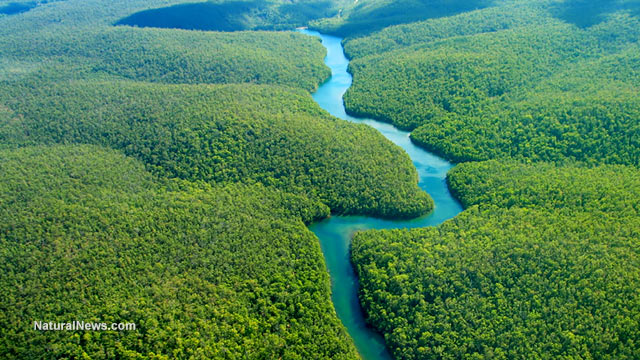Deforestation is causing rainforests to catch on fire... and no one is putting out the flames
Saturday, July 02, 2016 by: J. D. Heyes
Tags: rainforest, deforestation, forest fires

(NaturalNews) New research has determined that human disturbances have made the Amazon rainforest much more flammable and that even in areas of protected forest human activity has degraded the landscape.
As reported by the BBC, the two-year study of the Brazilian Amazon found that a range of activity including logging and defragmentation has dramatically increased the chance for more wildfires.
Though the Brazilian Amazon is supposed to be protected from widespread deforestation, the new study, which was published in the journal Nature, suggests that a larger effort is necessary to "safeguard the hyper-diversity of tropical forest ecosystems."
As the BBC noted further, the study's authors pointed out that on their own, rainforests are not normally in danger of igniting.
"Rainforests don't normally burn," said the study's lead researcher, Prof. Jos Barlow, from the Lancaster Environment Center. "But human activities are making them much more flammable."
50 percent – not the required 80 percent
The research team's goal was to measure the effects that humans were having on the rainforest, which was not an easy thing to do given the sheer size of it at 5.5 million square kilometers (2.1 million square miles). But in order to accomplish the research, the team selected 400 plots on a gradient of forest cover, which ranged from pristine to deforested areas.Over the span of two years the team gathered data from the sites in the Eastern Amazon through a tedious analysis of tree, bird and insect densities. Importantly, the study looked at areas of forest that are supposed to be protected by the Forest Code, a centralized policy that was designed to limit deforestation by requiring landowners in the Amazon to maintain at least 80 percent forest coverage.
"If you can imagine a landscape with 80 percent forest cover, I think most environmentalists would say that's a very good scenario and you've maintained most of your core habitat there," Barlow told the BBC. The BBC noted further:
Selective logging, for example, can leave the forest fragmented or punch holes in the canopy, drying out the vegetation below. This, combined with the effects of climate change, is leaving the Amazon much more likely to catch fire.
Another member of the team, Dr. Alexander Lees from Cornell University, said that many bird species unique to the Amazon were suffering the most from these effects. These endemic species, he said, "cannot survive in disturbed forests."
'Immediate action is required'
"Protecting tropical forests is a fundamental pillar of many national and international strategies for conserving biodiversity," said the study. "Although improved regulatory and incentive measures have reduced deforestation rates in some tropical nations, the conservation value of the world's remaining primary forests may be undermined by the additional impacts of disturbance, which falls into two broad categories."First, landscape disturbance results from deforestation itself, with area, isolation and edge effects degrading the condition of the remaining forests," the study continued. "Second, within forest disturbance, such as wildfires and selective logging, induces marked changes in forest structure and species composition."
Barlow also noted, "We need to keep focusing on reducing deforestation, but we need to think about forest disturbance - how we can monitor it, how we can reduce it, and how we can maintain pristine forest in large blocks as well."
He added: "Immediate action is required to combat forest disturbance in tropical nations," said Silvio Ferraz from the University of Sao Paulo, who was also involved in the study. "This is particularly important in Brazil, which holds up to 40 percent of the world's remaining tropical forests."
Sources:
http://www.bbc.com
http://www.bbc.com
http://www.nature.com
http://www.sciencemag.org
http://www.science.natural.news.com
www.bbc.com
Rainforest at FETCH.news
Get independent news alerts on natural cures, food lab tests, cannabis medicine, science, robotics, drones, privacy and more.
Take Action: Support Natural News by linking to this article from your website
Permalink to this article:
Embed article link: (copy HTML code below):
Reprinting this article:
Non-commercial use OK, cite NaturalNews.com with clickable link.
Follow Natural News on Facebook, Twitter, Google Plus, and Pinterest
- CLOT SHOT PLANDEMIC UNFOLDING: Fibrous, rubbery clots caused by covid injections have prion-like seeding activity
- Widespread social and economic unrest: Steve Quayle issues urgent financial warning of imminent asset collapse in new interview with Mike Adams
- DEATH by VACCINE or face PRISON time: Canadian Freedom Convoy leaders CONVICTED for protesting forced vaccination during the Covid Plandemic
- How to detox from metals falling out of the sky
- Aerosolized bioweapons? Strange “diploid biomasses” falling out of the sky in Florida captured under the microscope
- How the peanut allergy epidemic was fueled by faulty science and institutional arrogance
- U.S. Military EXITS fake “Climate Change” hoax after a DECADE of wasting time, money, manpower and resources
- Rep. Jamie Raskin demands that 17 deported Tren de Aragua and MS-13 gang members be returned to the U.S. from El Salvador
- “Rockefeller Medicine Men”: Today’s healthcare crisis stems from the creation of the American medical establishment
- The hidden war above: Chemtrails, HAARP and the battle for planetary control
- Global financial Ponzi scheme collapses in real time as markets plummet, Mike Adams and Steve Quayle warn of impending chaos
- How Israeli military-connected corporations are secretly controlling your online privacy
- Analysis: The coming economic collapse, a mass uprising and Trump's three secret weapons to halt the growing revolt
- Defunding DEADLY mRNA jabs: Government funding for mRNA technology being scrutinized and sidelined until proven "safe and effective" for real
- Washington State expands hate crime bill but ignores left-wing violence against Tesla owners
- Kiss Your Genetic Privacy Good-Bye! 23andMe Gets Green Light to Sell Your Intimate Genetic Details to Anyone They Want
- Elon Musk exposes widespread Social Security fraud: “Someone is going to be arrested”
- Mike Adams releases country western hit single: Goin’ Back in Time is Comin’ Home
- Aerosolized bioweapons? Strange “diploid biomasses” falling out of the sky in Florida captured under the microscope
- European Court of Justice: Healthcare professionals who promoted or administered COVID-19 vaccines are CRIMINALLY LIABLE for any harm caused
- Newly released JFK files reveal Pentagon's role in creating Lyme disease and covid in the same lab
- Analysis: The coming economic collapse, a mass uprising and Trump's three secret weapons to halt the growing revolt
- FBI imposed gag order on agents to silence Hunter Biden laptop truth before 2020 election, new chat logs reveal
- Britain’s descent into police state censorship: Parents raided for questioning their daughter’s school system online
- “Project Aldrin”: Senate probes Meta's alleged censorship dealings with China
- Kiss Your Genetic Privacy Good-Bye! 23andMe Gets Green Light to Sell Your Intimate Genetic Details to Anyone They Want
- Oncologist warns of ‘terrifyingly aggressive’ cancers in children, linked to immune suppression from COVID vaccines
- Mike Adams releases country western hit single: Goin’ Back in Time is Comin’ Home
- Utah governor allows ban on LGBT pride flags in public buildings and schools, will take effect without his signature
- AI-powered forecasting model proves more accurate than traditional systems at predicting the weather
- When antibiotics are unavailable, natural ANTIMICROBIAL compounds become essential first line defenses against infection
- German researchers find link between mRNA vaccines and GENETIC CHANGES that precede CANCER and AUTOIMMUNE DISORDERS
- Defunding DEADLY mRNA jabs: Government funding for mRNA technology being scrutinized and sidelined until proven "safe and effective" for real
- The Health Ranger releases “Vaccine Zombie” song and music video, using AI-animated zombies for the music video
- Dr. Mary Talley Bowden drops bombshells about children being permanently damaged by mRNA jabs during Tucker Carlson interview
- The hidden war above: Chemtrails, HAARP and the battle for planetary control
- Newly released JFK files reveal Pentagon's role in creating Lyme disease and covid in the same lab
- California's social media censorship law struck down: A victory for free speech or a threat to online safety?
- The Health Ranger releases “Vaccine Zombie” song and music video, using AI-animated zombies for the music video
- Dr. Mike Yeadon releases 15-minute testimony - WATCH - about genocidal intent of COVID “vaccines”
- EPA advisor admits the agency is funneling billions to climate groups ahead of Trump’s return to White House
- Rep. Nancy Mace introduces bill to ban biological males from female facilities on federal property
- Mike Adams releases country western hit single: Goin’ Back in Time is Comin’ Home
- Florida takes a stand: DeSantis proposes permanent ban on mRNA vaccine mandates
- Sugarcane extract superior to cholesterol-lowering drugs?
- Survival 101: Effective EMF blocking techniques
- OpenAI whistleblower who dissented against how the company trained ChatGPT found dead
- CONSERVATIVES SOUND THE ALARM: Big Pharma and the Left trying to force $32 billion money grab from America’s seniors into year-end spending deal
- Pilots report mysterious lights 'moving at extreme speeds' across Oregon skies
- Attorney and TikTok influencer explains how he was offered hundreds of dollars to make false claims about Trump, Republicans
- Trump reverses course on Gaza plan, says “nobody is expelling Palestinians”
- Trump expected to choose Kelly Loeffler as his agriculture secretary even though she was caught INSIDER TRADING during COVID
- MEDICAL BOMBSHELL: FDA admits Covid mRNA 'Vaccines' CAUSE CANCER
- Marketing director responsible for WOKE Jaguar rebrand is also an LGBT activist who supports Black Lives Matter
- Red Cross issues warning to stop blood plasma donations from vaccinated people
- Scientists confirm: GENIUS brain function can be spontaneously unleashed in humans without any apparent cause
- EPA advisor admits the agency is funneling billions to climate groups ahead of Trump’s return to White House
- HYSSOP: What research reveals about the health benefits of this ancient holy herb
- Two containers with completed ballots fall out of truck in Florida
- Fully vaccinated about to see “tsunami” of illness and death, warns virologist
- Global leaders unite to clamp down on “misinformation” with UN-backed Cascais Declaration
- Newly released JFK files reveal Pentagon's role in creating Lyme disease and covid in the same lab
- BREAKING: 2025 NDAA authorizes mandatory military draft of WOMEN across America… as Pentagon pursues global NUCLEAR war with both Russia and China at the same time
- Michael Yon warns of a ZIONIST TAKEOVER in Trump’s second administration
- Ozempic and Wegovy weight loss drugs are injectable LIZARD VENOM PEPTIDES that may unleash a devastating wave of organ failure… side effects align with symptoms of SNAKE BITES
- BOMBSHELL: DNA testing kits are a SCAM to develop ethnic-specific bioweapons
- The Health Ranger releases “Vaccine Zombie” song and music video, using AI-animated zombies for the music video
- Israeli soldiers accused of even more torture and abuse in the West Bank
- These 13 countries just signed an agreement to engineer a global FAMINE by destroying food supply
- NASA admits that climate change occurs because of changes in Earth’s solar orbit, and NOT because of SUVs and fossil fuels
- RFK Jr. clears key hurdle: Sen. Susan Collins backs controversial HHS nominee, signaling a new era for health policy
- Sermon 30: How Jesus reveals Caesar’s FAKE CURRENCY and FALSE AUTHORITY
Science News & Studies
Medicine News and Information
Food News & Studies
Health News & Studies
Herbs News & Information
Pollution News & Studies
Cancer News & Studies
Climate News & Studies
Survival News & Information
Gear News & Information
News covering technology, stocks, hackers, and more



"Big Tech and mainstream media are constantly trying to silence the independent voices that dare to bring you the truth about toxic food ingredients, dangerous medications and the failed, fraudulent science of the profit-driven medical establishment.
Email is one of the best ways to make sure you stay informed, without the censorship of the tech giants (Google, Apple, Facebook, Twitter, YouTube, etc.). Stay informed and you'll even likely learn information that may help save your own life."
–The Health Ranger, Mike Adams












































